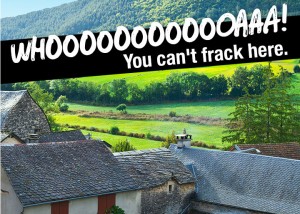 SUMMARY: Ahead of the upcoming climate negotiations in Paris, our activists are helping turn the tide on fracking in Europe.
SUMMARY: Ahead of the upcoming climate negotiations in Paris, our activists are helping turn the tide on fracking in Europe.
Earlier this month, as part of the Global Frackdown to Paris, we released a letter signed by over 1,250 groups in 64 countries, sending a strong signal to the world’s leaders that fracking and extreme energy extraction must not be part of any plan to tackle climate change that comes out of the international climate conference in Paris later this month.
President Obama received his letter in early November, and so did European Members of Parliament last week, and just in time: the European Parliament’s Industry’s Committee was scheduled to vote on a report on EU’s energy future. Following the events in Ukraine and the increased reliability of European gas imports from Russia, a conservative Polish Member of the European Parliament, Marek Gróbarczyk, had written a draft of the report, which sang the praises of fracking.
But his pro-fracking rhetoric rang particularly hollow, as the long-standing support from Polish politicians for a shale boom à l’Américaine has resulted in nothing but disappointment, with one after the other oil and gas company pulling out. As soon as the draft report was published, Food & Water Europe alerted Gróbarczyk’s colleagues in the Parliament about the egregious pro-fracking tone of the report. There was considerable pushback and a so-called “compromise amendment” was drafted, which called into question Grobarczyk’s claims about fracking. We also called on European citizens to write to their elected representatives to support a new text, which sets the record straight about shale gas. More than 800 European citizens wrote to their Members to support pro-renewables and efficiency amendments and reject any pro-fracking language. And on the evening before the vote, we snuck into the European Parliament just before closing time to go and stick a 2-meter long version of the ‘Global Frackdown to Paris’ letter – with the names of all 1,250 partners on it – on the office doors of each and every member of the Industry Committee, just to make sure that they got the message.
In sharp contrast to the initial draft, we are happy to report that the final text reads as follows:
While recognising that the energy mix is primarily a Member State competence, [the committee] acknowledges the public concerns about hydraulic fracturing and the consequences this technology might entail for the climate, environment and public health and the achievement of the EU’s long term decarbonisation goal; furthermore, recognises that the limited potential of unconventional fuels to help meet the EU’s future energy demand, coupled with high investment and exploitation costs and the current low global oil prices, means it is questionable whether hydraulic fracturing can be a viable technology in the European Union; believes that public concerns must be properly addressed and any hydraulic fracturing activities should comply with the highest climate, environmental and public health standards; asks those Member States which intend to pursue hydraulic fracturing to respect the 2014 European Commission recommendation on minimum principles for the exploration and production of hydrocarbons (such as shale gas) using high-volume hydraulic fracturing;
We’re particularly satisfied that the Members of the European Parliament not only highlighted the environmental impacts of fracking, but also clearly recognized that fracking for shale gas will do nothing to reduce Europe’s reliance on fossil fuel imports and gas in particular. Moreover, the Industry Committee rightly endorsed the view that shale gas is a high-cost resource in a (currently) low-price environment. Last but not least, Members of the European Parliament for the first time openly questioned the compatibility of developing shale gas with the EU’s commitment to completely decarbonize its economy in the next 35 years. I think that we can say that the message from the 2015 Global Frackdown to Paris came through loud and clear. Thanks to everyone who supported our efforts!
This year’s Global Frackdown is not over yet. We will also be ramping up our campaign to ban fracking during the Paris climate summit.


